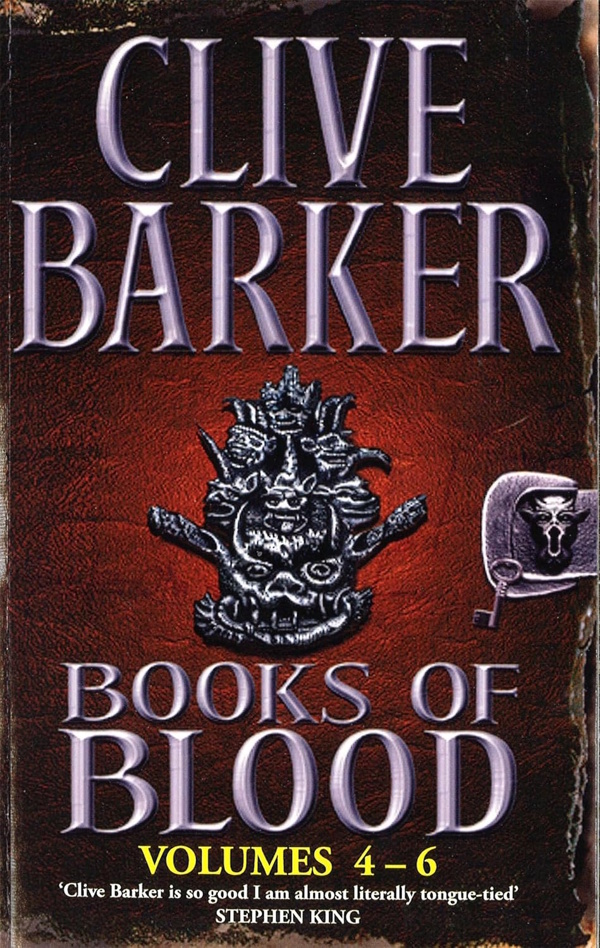Books of Blood, Vols. 4-6
 |
 |
 |
 |
 |

- Publication Date: 1985 (Individual Volumes)
1998 (Collected Edition) - Written by: Clive Barker
- Page count: 449
For some reason, I don't seem to see Books of Blood, Vols. 4-6 talked about as much as I do Vols. 1-3. Maybe that is because Vols. 1-3 had so many wildly original stories that they just overshadowed everything that came afterwards. The Midnight Meat Train, Pig Blood Blues, In the Hills, the Cities, Dread, Rawhead Rex and others are some of my go-to recommendations when it comes to introductory Barker stories. That being said though, Books of Blood, Vols. 4-6 has so much to offer, and even though it technically features fewer stories, there's so much imagination packed into these pages.
What makes Vols. 4-6 different from Vol.s 1-3 is that the stories are longer this time around. Volume 5 and Volume 6 each contain four novella-length stories as opposed to the five to six stories featured in the previous volumes. If you read them in order, you start to get the feeling that Barker was becoming more and more confident in his writing ability, slowly spreading his wings until he would finally write his first novel, The Damnation Game. While still very gruesome in their outcomes, many of the stories in Vols. 4-6 place a little more emphasis on their characters and the buildup to the horror itself. Sometimes, half of the story will go by before any horror begins to happen. On your first reading, you may be tempted to feel that the stories are a little more slow and boring in these volumes, but stick around and give them a chance. There's so much to love here. Some of the standouts here include The Age of Desire, which focuses on a man who is injected with an experimental aphrodisiac that turns him into a sexually-ravaging beast; How Spoilers Bleed, a tale of Amazon natives that put a curse on European soldiers that makes them bleed from every opening in their skin; and The Forbidden, which would later be adapted into one of my favorite slasher films, Candyman.
I will say, there are a few stories that do feel like filler at times. Revelations in Volume 4, Babel's Children in Volume 5, and Twilight at the Towers in Volume 6 are all stories that I get the urge to skip when I revisit this book. That's not to say that they're bad stories. Babel's Children, for example, has the fun premise of every world event being determined by a group of old scholars who are playing games of chance. I just don't find their premises to be as strong as some of the stories that came before. Part of me wishes that Barker had cut these, and instead expanded the remaining stories into even longer novellas. You can tell that he was itching to write longer work and was experimenting with what types of characters and scenarios he could stretch into longer tales. This did lead to some good stuff though. The final long story, The Last Illusion, introduces paranormal investigator Harry D'Amour, who would go on to play a major role in Barker's later novel, Everville. We even get a very short coda story at the end of the collection, On Jerusalem Street, which shows us what happened to the "book of blood" that we've been reading for the past six volumes. It's a great little conclusion, and it always makes me want to go back and read the series all over again.
It was a great relief to tell the story. Not because he wanted to be remembered, but because the telling relieved him of the tale. It no longer belonged to him, that life, that death. He had better business, as did they all. Roads to travel; splendours to drink down. He felt the landscape widen. Felt the air brightening.
What the boy had said was true. The dead have highways.
Only the living are lost.
Books of Blood, Vols. 4-6 packs just as much sex, death and violence as Vols. 1-3 did. If the first set left you hungry for more, then pick this collection up if you can find it. After this, Barker would move on to full novels, and the imagination would only get more and more wild from here.



